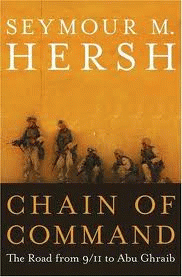Book Review
The introduction by David Remnick, which provides a comprehensive summary of Hersh's journalistic career, is an essential feature of Chain of Command. I was previously unaware that Hersh also broke the story of the My Lai massacre in Vietnam in 1969. According to Remnick, Hersh also broke the story (in the mid-70s) about the CIA spying on domestic "enemies," Kissinger's surveillance of government employees, the CIA coup in Chile, and the Nixon administration's secret bombing of Cambodia.
Exactly How Much Does Hersh Reveal About 9/11?
Remnick notes that Hersh has written 26 articles for The New Yorker since 9/11 -- on the intelligence failures leading to 9/11, the corruption of the Saudi Royal Family, threats to the security of the Pakistani nuclear arsenal, shortcomings of post-war planning in Afghanistan and Iraq, the mishandling of the federal prosecution of the 20th hijacker Zacarias Moussaoui, the forged intelligence indicating that Iraq had weapons of mass destruction and links to the 9/11 attacks, and finally the torture scandal at Abu Ghraib. Chain of Command summarizes and elaborates on each of these original articles.
Is Chain of Command "Damage Control"?
In Language of Empire, Lila Rajiva observes that Seymour Hersh's disclosure of torture at Abu Ghraib seems like a "limited hangout" or "controlled opposition" disclosure -- in other words what Barry Zwicker refers to as "the kind of opposition the US elite can live with."
After reading Chain of Command, I tend to share Rajiva's view. The book, which purports to explain how the US became involved itself in two extended, budget breaking, unwinnable wars, seems to attribute them to the recklessness of a handful of Republican hawks -- chiefly Rumsfeld, Cheney and Wolfewitz, in that order. There is no mention whatsoever of the involvement of all three men in the corporate-funded think tank Project for a New American Century, which called for US military intervention in the Middle East back in 1997. The PNAC Statement of Principles, signed by Rumsfeld, Cheney, Wolfewitz and other neoconservatives, clearly argues for military domination of the Middle East for geopolitical reasons -- which other PNAC documents link directly to US energy policy and access to oil and natural gas resources.
Infighting in the Bush Administration
That being said, I found the book an interesting read, mainly for its detailed description of infighting within the Bush administration regarding both invasions (key players in the Pentagon, CIA, FBI and State Department opposed both wars). I was also intrigued by the section describing how Secretary of Defense Rumsfield alienated officials at both the Pentagon and the CIA by insisting on micromanaging both military and intelligence operations in both wars (he repeatedly ignored advice and/or replacing the generals he disagreed). He also created his own intelligence network to process raw intelligence and his own Special Access Program, responsible for torture and interrogation at Abu Ghraib and kidnapping suspected terrorists and transporting them to secret CIA prisons in Singapore, Thailand, Pakistan and elsewhere. Hersh's sources in the Pentagon directly blame Rumsfield's micromanagement (and significant under-resourcing of equipment and personnel) for the current military quagmire in both Iraq and Afghanistan, as well as the unnecessary loss of hundreds of American lives.
Israel Vetoes Collaboration with Syria and Iran
The other chapters I found valuable relate to Hersh's view that the Bush administration made the wrong call with regard to Syria and Iran, which both offered support in the wars in the Middle East. Syria, a secular state, probably had the best intelligence in the world on Muslim extremists, as many used the country as an operational base. The Syrian government was quite eager to share this intelligence to expedite their removal from the US list of terrorist states (and an end to trade sanctions on Syria). Instead Rumsfield openly advocated expanding the war on Iraq into Syria. Hersh reveals that Iran, which actively supported the US invasion of Afghanistan, also relayed sensitive intelligence on Afghanistan to the Bush administration, as well as offering Iranian airbases for American search and rescue operations. According to Hersh, both Syrian and Iranian offers of assistance were refused because Israel vetoed them.
Significant Omissions
(Note: You can view every article as one long page if you sign up as an Advocate Member, or higher).






